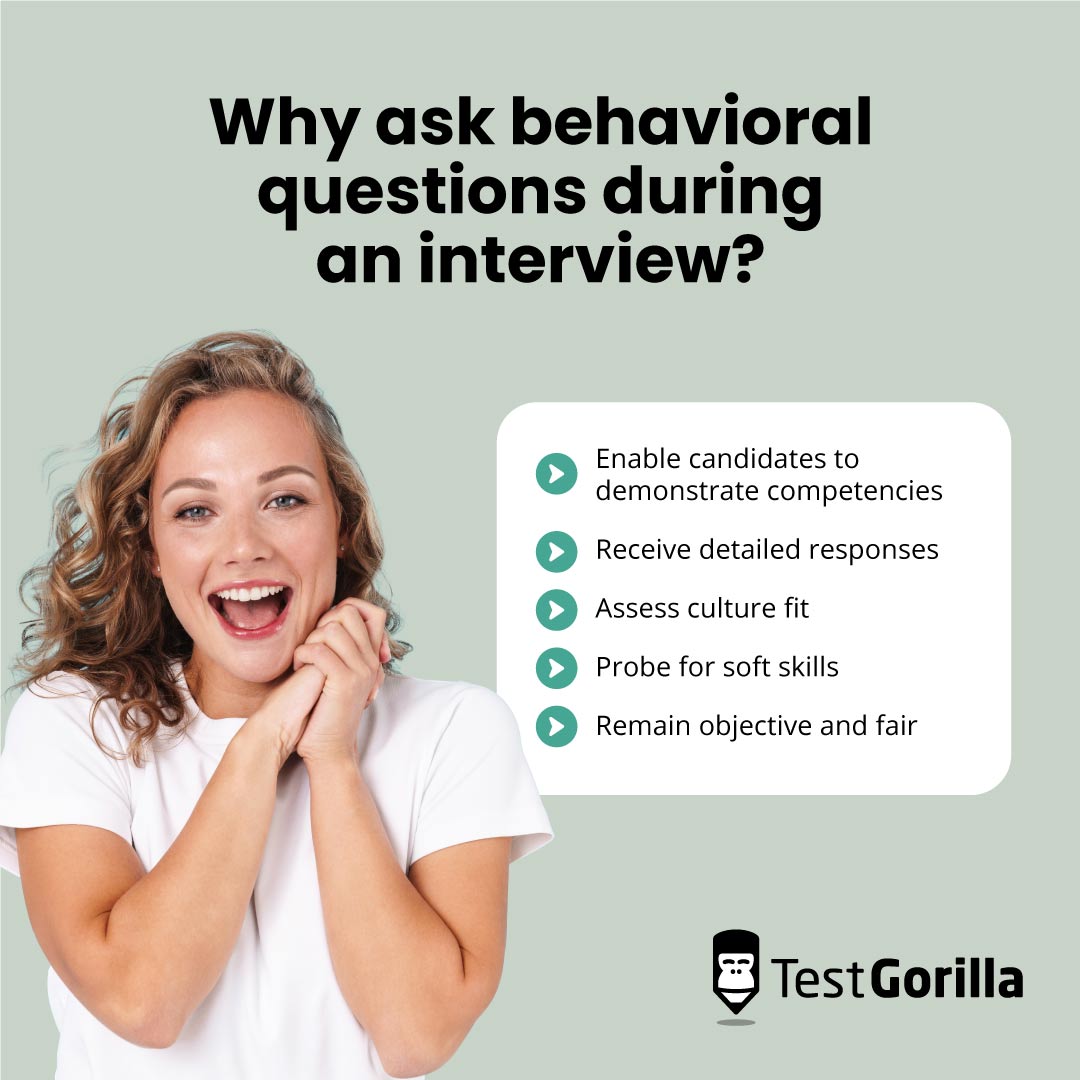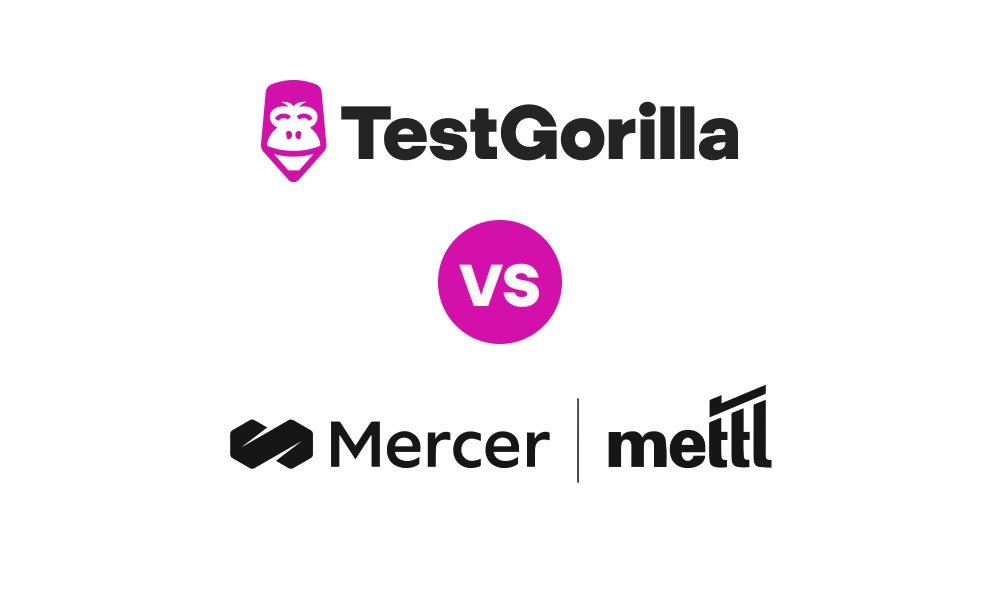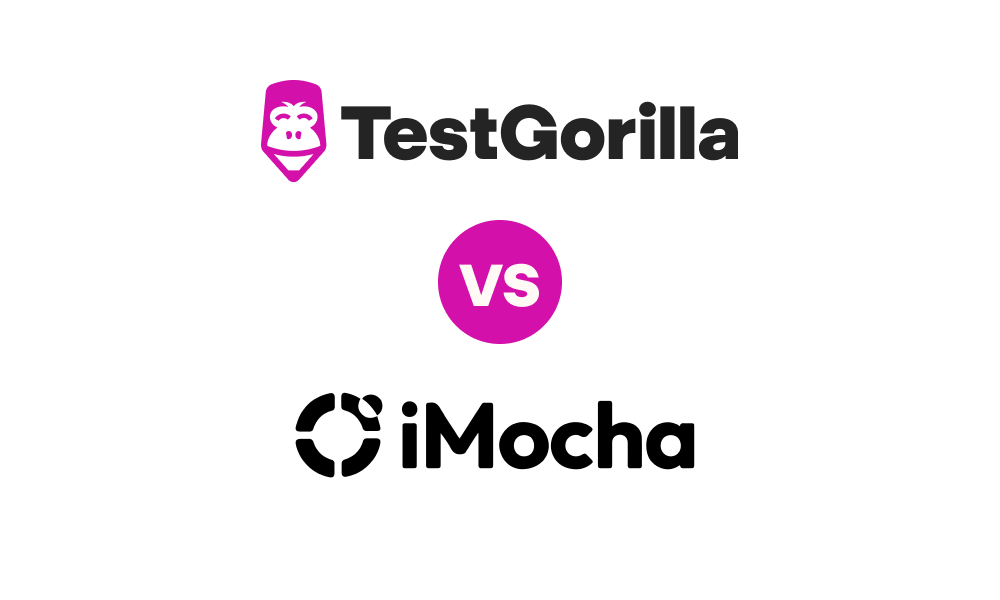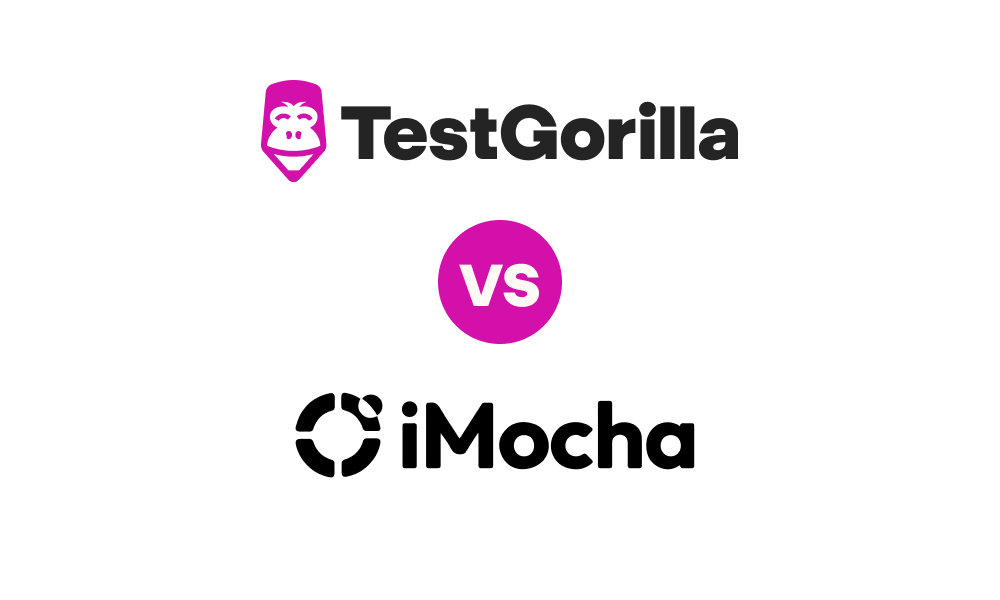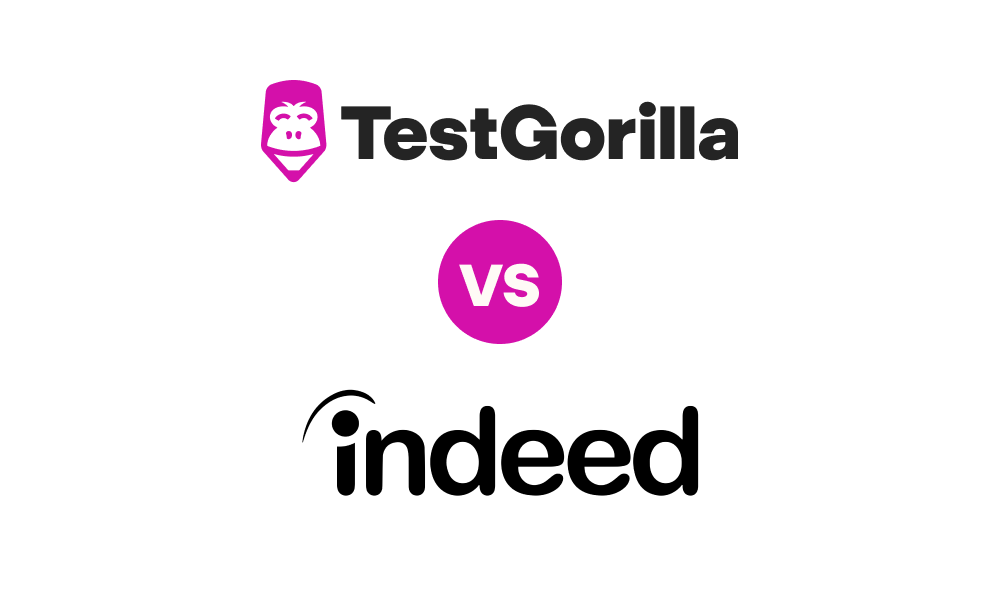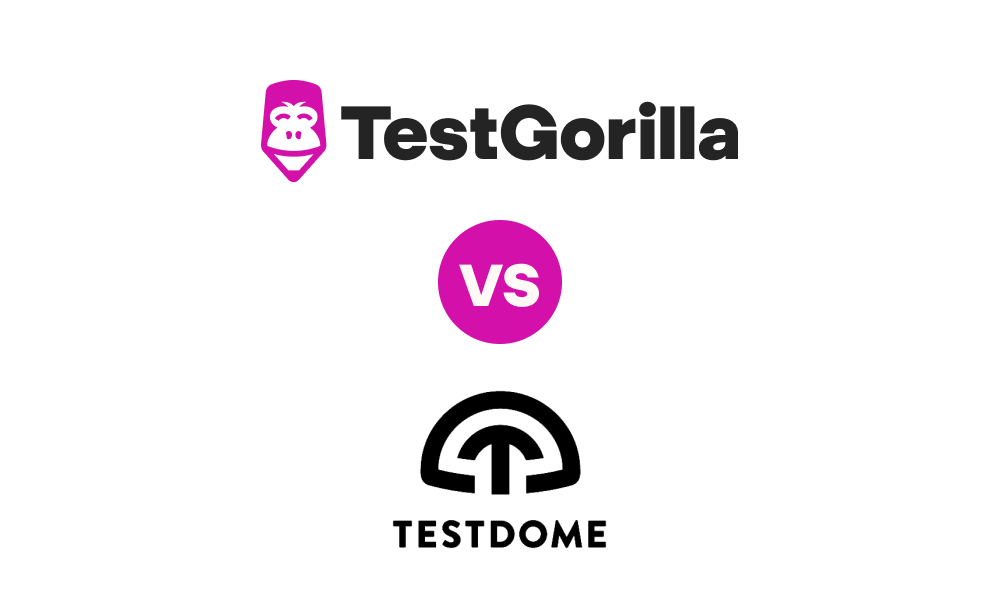Data science behavioral interview questions are an effective way for hiring managers and recruiters to dig into candidates' past experiences and see how they might handle things in their new role. These questions ask applicants to share detailed work-related experiences for specific situations within their field.
When hiring data scientists, behavioral interview questions help you assess their teamwork, adaptability, time management, and communication traits. You can also better understand their motivation, values, growth potential, and more.
That said, it’s crucial to know which questions to ask. In this article, we share 24 data science behavioral questions and the responses to look for so you can pick the perfect person for your open positions. We also explain how to roll out behavioral interviews at your organization.
Table of contents
What are behavioral interview questions?
Behavioral interview questions help you delve into a candidate’s experiences and how they’ve demonstrated certain personality traits and behavioral characteristics at work.
Candidates will provide concrete examples of how they solved a problem or responded to a situation in the workplace. They also often present hypothetical scenarios to gauge how applicants might react in certain situations.
Behavioral interview questions usually start with phrases like:
"Can you tell me about a time when..."
"Give me an example of..."
"Describe a situation where..."
“How you would respond to…”
“What steps would you take if…”
Candidates’ responses can help you assess their potential performance in the future. You can evaluate their skills in conflict resolution, communication, problem-solving, and more. With these insights, you can get a clear idea of how well the candidate will fit into your existing team.
Why ask behavioral questions during an interview?
Data science behavioral interview questions do much more than offer a look into your candidate’s past. They also:
Enable candidates to demonstrate competencies
When you ask your data science candidates behavioral interview questions, you give them a chance to showcase how they meet the role's requirements. They can demonstrate their suitability for the role by offering tangible evidence of their competencies.
For example, you might ask a candidate about a time when they needed to create a model, avoid overfitting it, and how they achieved that. Your candidate should be able to tell you a few best practices, such as simplifying the model while telling you exactly how they simplified it. A qualified data scientist must be able to carry out this function seamlessly to succeed in the role.
Receive detailed responses
By incorporating behavioral interview questions into your hiring process, you encourage candidates to offer thorough responses. Their ability to share specific examples of their experiences demonstrates their attention to detail – a critical skill in data science.
These questions also enable you to gather more detailed information than a typical interview might provide. For data scientists in particular, these questions can prompt them to discuss specific methodologies and tools they’ve used and how their analyses have impacted projects. These detailed responses enable applicants to demonstrate that they’re technically competent and can communicate with others effectively.
Assess culture fit
Data science behavioral interview questions help you assess a candidate’s culture fit, as they help you understand their core values and behavioral traits.
For instance, you can see how prospective hires build professional relationships with their colleagues, communicate with team members, and resolve conflicts. You can also get answers about what motivates them.
These insights make it easier to see how well each candidate will work within your team.
Probe for soft skills
Asking behavioral questions enables you to identify your candidate’s soft skills, such as communication, problem-solving, adaptability, and teamwork. These skills are essential for data scientists, who often need to interact with members of multiple departments.
Evaluating communication skills, in particular, is essential when hiring a data scientist. They should be able to communicate complex information to their non-technical colleagues. This way, data doesn’t get misinterpreted across departments and negatively impact final reports or decisions.
Remain objective and fair
A consistent, structured interview approach helps you remain objective while evaluating prospective hires, and behavioral interview questions foster this approach. By asking each candidate the same questions and comparing their responses, you can evaluate them for the same skills and avoid biased hiring decisions.
24 behavioral interview questions for data science and answers to look for
Teamwork behavior questions for data science
Data science requires collaboration across different departments, so you’ll want to ensure your candidate works well within a team.
When assessing your candidate’s teamwork behavior, look for responses that demonstrate their ability to:
Share the workload with team members
Practice open communication
Practice active listening
Value diverse perspectives
Find solutions and maintain a positive team dynamic
Here are a couple of questions to ask:
Describe a situation where you had to work closely with a cross-functional team to solve a complex data problem.
How do you ensure effective collaboration where everyone uses their expertise to achieve a project's objectives?
Tell me about a time you encountered a disagreement within your data science team while working on a project. What steps did you take to resolve the conflict?
Adaptability behavior questions for data science
Data scientists often work with data from diverse sources, and some problems are more complex than others. Therefore, they need to be adaptable in analyzing data and using different tools.
Adaptability also enables data scientists to address changing business needs and stay flexible as new techniques arise.
To screen for adaptability, consider asking these questions:
Tell me about a project where the data landscape changed unexpectedly midway through your analysis. How did you adjust your approach to accommodate these changes, and what strategies did you use to ensure the project's success despite the unexpected challenges?
Describe a situation where you had to learn a new data analysis tool or programming language to complete a project.
How do you approach new learning processes, and how quickly do you typically integrate new knowledge into your work?
Ideal responses will show that applicants:
Respond well to unexpected changes
Possess problem-solving skills
Can adjust the tools they use for data sets
Work well in dynamic environments
Can seamlessly accommodate changing data requirements or constraints
Time management and prioritization behavior questions for data science
Strong time management skills help data scientists gather and analyze large datasets while meeting tight deadlines. This goes hand in hand with prioritization, as data scientists must know where to focus their time and which tasks to complete first to ensure projects run smoothly.
Here are some questions to assess your prospective hires’ time management and prioritization skills:
How do you prioritize competing data projects to ensure each one receives sufficient attention and is completed on time?
How do you handle unexpected delays while working on projects?
Describe a time when you faced multiple data requests with tight deadlines. How did you plan and organize your work to meet these demands?
How do you plan and schedule your daily work tasks?
Tell me about your approach to managing your time during long, complex projects.
Listen for responses that show a candidate has strong organizational skills, can deliver high-quality results on time, and can effectively shift priorities when challenges arise. The best answers will also demonstrate a candidate’s ability to balance time-sensitive tasks, implement contingency plans, and allocate time appropriately each day.
Communication behavior questions for data science
Data science requires effective communication. When handling large amounts of data and presenting their analyses to different stakeholders, data scientists must adjust their communication styles so everyone – both technical and non-technical audiences – can easily understand them.
Consider asking these questions to assess applicants’ communication styles:
Share an experience where you had to present complex data findings to a technical audience.
How do you ensure that your presentations are clear, concise, and effectively display key insights without overwhelming your audience with technical details?
Describe a situation where you had to communicate with a non-technical audience. How did you tailor your communication to ensure they understood your message?
You’ll want to look for applicants who:
Demonstrate good active listening skills
Can convey complex data concepts to both technical and non-technical audiences
Use clear and concise language, avoiding jargon when communicating with non-technical stakeholders
Understand the importance of verbal and non-verbal communication cues
Can vary their communication approach based on their audience
On the other hand, be wary of candidates whose responses demonstrate little emotional intelligence or an abrupt or dismissive communication style.
Motivation and values behavior questions for data science
Handling data requires high ethics, and the job can test many individuals’ motivation over time. Therefore, understanding a candidate's motivation and values is vital in determining their potential for success within the field.
Ask your applicants these questions to evaluate their motivation and values:
What drives your passion for working in the data science field?
Can you share an example of a project where your motivation played a significant role in achieving successful outcomes?
Describe a time when you faced ethical dilemmas in a data-related project. How did you handle these challenges, and what steps did you take to ensure the ethical use of data and maintain the integrity of the analysis?
You’ll want to look for responses that:
Showcase ethical decision-making
Display their commitment to upholding ethical standards in their work
Shows genuine enthusiasm for data science
Alternatively, avoid candidates who don’t express an ability to prioritize ethics in data analyses and aren’t passionate about data science.
Growth potential behavior questions for data science
In highly technical fields such as data science, professionals regularly develop new techniques to analyze data. Data scientists must continuously learn these new approaches to keep their skills current and meet their company’s demands.
Understanding your candidates’ potential for this growth helps you gauge whether they’ll thrive at your company in the long term.
You can assess your applicants’ growth potential by asking these questions:
How do you seek opportunities to enhance your data science skills and stay updated with industry trends and advancements?
Can you provide an example of how continuous learning has contributed to your professional growth?
Share a situation where you encountered a challenging data problem outside your expertise or skill level. How did you approach the situation? What steps did you take to develop the skills necessary to overcome the challenge?
Listen for candidate responses that:
Demonstrate their interest in actively improving their skills
Display curiosity and adaptability
Show a willingness to step out of their comfort zone
Showcase resourcefulness and resilience
Leadership behavior questions for data science
When assessing your data science candidate for leadership, there are several key characteristics to look out for. Your candidate should understand the importance of diplomacy, fairness, conflict resolution, and how to lead their team effectively.
Ask these questions to assess their leadership behaviors:
Can you describe a time when you led a decision-making process within a data science team? How did you ensure everyone’s voices were heard?
Tell me about a time when you led a data science project or collaborated with a team to achieve a common data-related goal.
When working on complex data projects, how do you motivate your team members and offer support to guide them to project completion?
Share an example of when you resolved a conflict within your data science team.
Strong responses from prospective hires will show that they:
Understand how to delegate
Promote healthy conflict resolution tactics
Can communicate with others clearly and respectfully
Encourage team members and exhibit empathy during times of high stress
Demonstrate diplomacy when working within a team
How to roll out behavioral interviews
Using behavioral interviews in your hiring process requires careful planning and preparation. Follow these steps to integrate behavioral interviews at your organization.
1. Define core competencies
The first step is to establish the key traits and competencies you’re looking for in a data science candidate.
Start by defining the job-specific skills they’ll need. A data scientist must be proficient in advanced math and statistics. They must also be able to collect, interpret, analyze data, and create models.
In addition, your candidate should possess the personality traits that make them a good cultural fit at your company. For example, they may need to be a team player, adapt quickly to changes, and support their team members.
Defining the role’s core competencies will inform the questions you create for your behavioral interview.
2. Implement the STAR method when creating behavioral questions
The STAR method is a technique that helps you evaluate a candidate’s past experiences and behavior. It stands for Situation, Task, Action, and Result.
Using this method to structure your behavioral questions, you can prompt candidates to give detailed examples of how they’ve handled situations related to your defined core competencies. Candidates will speak about situations requiring them to complete certain tasks, describe their actions, and share the results they achieved.
3. Use consistent criteria
To avoid bias during behavioral interviews, assess all candidates based on the same criteria. Develop a standardized framework for evaluation, such as a scoring rubric.
Your rubric could include criteria such as communication skills, teamwork, problem-solving abilities, and technical knowledge. You might use a scale of 1 to 5 for each criterion, with clear descriptions for each score.
This will help ensure you assess all applicants fairly and objectively.
4. Combine them with other assessment methods
Avoid relying solely on behavioral interviews when evaluating your candidates. Instead, combine behavioral interview questions with other evaluation methods – such as skills tests, cognitive assessments, and situational judgment tests. This way, you can get a more comprehensive view of each applicant and make better, more informed hiring decisions.
TestGorilla’s expansive test library makes this easy. It has more than 300 reliable, easy-to-implement tests that assess job-specific skills, personality traits, various soft skills, and more.
For data scientists, you can conduct a 10-minute Data Science test to evaluate their job competencies, then roll out an Enneagram Personality test or DISC Personality test to understand their behavioral preferences.
From there, you can hold your behavioral interviews to gain even more insight into each of your candidates.
5. Review and improve
After conducting behavioral interviews, ensure you gather feedback from each candidate. You might send a survey or email follow-up asking for their thoughts on the process.
These insights can help you review the effectiveness of your behavioral questions and the interview process. From there, you can make improvements for future hiring campaigns.
Combine these questions with skills testing by TestGorilla
Behavioral interview questions provide insight into your candidate’s past behaviors so you can understand how they may perform in the future. These questions enable candidates to demonstrate their competence for the role using real-life, detailed examples. You can assess their cultural fit and probe for soft skills while remaining objective and fair throughout the assessment.
When rolling out your behavioral interview questions, ensure you define the role’s core competencies, develop questions using the STAR method, and use consistent criteria to assess your candidates. Additionally, combine your behavioral interviews with other multi-assessments for a more holistic evaluation.
To start evaluating your candidates’ skills and attributes, sign up for a free TestGorilla plan today.
Related posts
Hire the best candidates with TestGorilla
Create pre-employment assessments in minutes to screen candidates, save time, and hire the best talent.
Latest posts
The best advice in pre-employment testing, in your inbox.
No spam. Unsubscribe at any time.

Hire the best. No bias. No stress.
Our screening tests identify the best candidates and make your hiring decisions faster, easier, and bias-free.
Free resources
This checklist covers key features you should look for when choosing a skills testing platform
This resource will help you develop an onboarding checklist for new hires.
How to assess your candidates' attention to detail.
Learn how to get human resources certified through HRCI or SHRM.
Learn how you can improve the level of talent at your company.
Learn how CapitalT reduced hiring bias with online skills assessments.
Learn how to make the resume process more efficient and more effective.
Improve your hiring strategy with these 7 critical recruitment metrics.
Learn how Sukhi decreased time spent reviewing resumes by 83%!
Hire more efficiently with these hacks that 99% of recruiters aren't using.
Make a business case for diversity and inclusion initiatives with this data.

